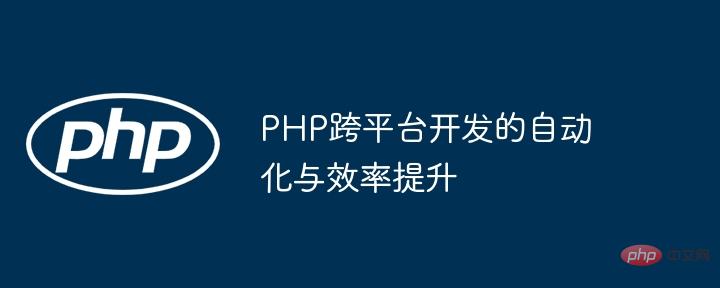 Backend Development
Backend Development
 PHP Tutorial
PHP Tutorial
 Automation and efficiency improvement of PHP cross-platform development
Automation and efficiency improvement of PHP cross-platform development
Automation and efficiency improvement of PHP cross-platform development
PHP cross-platform development can improve efficiency and automation with the following tools: Composer: Manage dependencies and eliminate the hassle of manual installation and updates. Docker: Package and run applications to provide a consistent cross-operating system operating environment. Vagrant: Manage virtual machines and quickly and easily set up development environments and configurations.

PHP Cross-Platform Development: Automation and Efficiency Improvement
Introduction
PHP It is a popular programming language widely used for web development. Its cross-platform compatibility makes it ideal for developing applications that can run on Windows, macOS, and Linux. This article will introduce tools and techniques for automating PHP cross-platform development to improve development efficiency.
Tools
- Composer: A dependency management tool for managing dependencies of PHP projects. It allows you to install and update packages on different operating systems, eliminating the hassle of manually installing and updating packages.
- Docker: A containerization platform for packaging and running applications in different environments. Docker containers provide a consistent runtime environment across operating systems, eliminating compatibility issues.
- Vagrant: A virtual machine management tool for creating and managing virtual machines running on different host operating systems. Vagrant enables you to quickly and easily set up a development environment, including the required software and configuration.
Practical Example
Create a simple PHP Hello World application to demonstrate how these tools simplify cross-platform development:
echo "Hello, world!";
Automated installation and dependency management
Use Composer to install the required dependencies:
composer install
Use Docker to create a consistent environment
Create a Dockerfile to define the application's runtime environment:
FROM php:8.1-apache COPY . /var/www/html RUN composer install
Then build and run the Docker image:
docker build . -t hello-world docker run -p 80:80 hello-world
Use Vagrant to manage the virtual environment
Create A Vagrantfile to define the virtual machine configuration:
Vagrant.configure("2") do |config|
config.vm.box = "ubuntu/xenial64"
config.vm.provision "shell", inline: "sudo apt-get update"
config.vm.install "php", "composer", "apache2"
endThen start the virtual machine:
vagrant up vagrant ssh composer install
Conclusion
By leveraging these tools, you can automate PHP cross- Many tasks of platform development, improving development efficiency and ensuring application compatibility and consistency on different operating systems.
The above is the detailed content of Automation and efficiency improvement of PHP cross-platform development. For more information, please follow other related articles on the PHP Chinese website!

Hot AI Tools

Undresser.AI Undress
AI-powered app for creating realistic nude photos

AI Clothes Remover
Online AI tool for removing clothes from photos.

Undress AI Tool
Undress images for free

Clothoff.io
AI clothes remover

AI Hentai Generator
Generate AI Hentai for free.

Hot Article

Hot Tools

Notepad++7.3.1
Easy-to-use and free code editor

SublimeText3 Chinese version
Chinese version, very easy to use

Zend Studio 13.0.1
Powerful PHP integrated development environment

Dreamweaver CS6
Visual web development tools

SublimeText3 Mac version
God-level code editing software (SublimeText3)

Hot Topics
 CakePHP Project Configuration
Sep 10, 2024 pm 05:25 PM
CakePHP Project Configuration
Sep 10, 2024 pm 05:25 PM
In this chapter, we will understand the Environment Variables, General Configuration, Database Configuration and Email Configuration in CakePHP.
 PHP 8.4 Installation and Upgrade guide for Ubuntu and Debian
Dec 24, 2024 pm 04:42 PM
PHP 8.4 Installation and Upgrade guide for Ubuntu and Debian
Dec 24, 2024 pm 04:42 PM
PHP 8.4 brings several new features, security improvements, and performance improvements with healthy amounts of feature deprecations and removals. This guide explains how to install PHP 8.4 or upgrade to PHP 8.4 on Ubuntu, Debian, or their derivati
 CakePHP Date and Time
Sep 10, 2024 pm 05:27 PM
CakePHP Date and Time
Sep 10, 2024 pm 05:27 PM
To work with date and time in cakephp4, we are going to make use of the available FrozenTime class.
 CakePHP File upload
Sep 10, 2024 pm 05:27 PM
CakePHP File upload
Sep 10, 2024 pm 05:27 PM
To work on file upload we are going to use the form helper. Here, is an example for file upload.
 CakePHP Routing
Sep 10, 2024 pm 05:25 PM
CakePHP Routing
Sep 10, 2024 pm 05:25 PM
In this chapter, we are going to learn the following topics related to routing ?
 Discuss CakePHP
Sep 10, 2024 pm 05:28 PM
Discuss CakePHP
Sep 10, 2024 pm 05:28 PM
CakePHP is an open-source framework for PHP. It is intended to make developing, deploying and maintaining applications much easier. CakePHP is based on a MVC-like architecture that is both powerful and easy to grasp. Models, Views, and Controllers gu
 CakePHP Creating Validators
Sep 10, 2024 pm 05:26 PM
CakePHP Creating Validators
Sep 10, 2024 pm 05:26 PM
Validator can be created by adding the following two lines in the controller.
 CakePHP Working with Database
Sep 10, 2024 pm 05:25 PM
CakePHP Working with Database
Sep 10, 2024 pm 05:25 PM
Working with database in CakePHP is very easy. We will understand the CRUD (Create, Read, Update, Delete) operations in this chapter.





